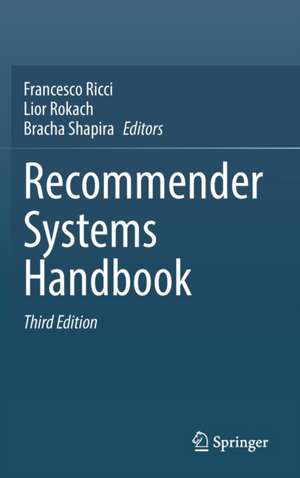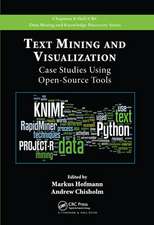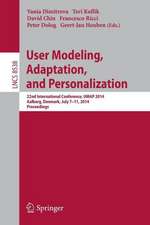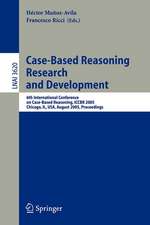Recommender Systems Handbook
Editat de Francesco Ricci, Lior Rokach, Bracha Shapiraen Limba Engleză Hardback – 23 apr 2022
The second part of this handbook introduces more advanced recommendation techniques, such as session-based recommender systems, adversarial machine learning for recommender systems, group recommendation techniques, reciprocal recommenders systems, natural language techniques for recommender systems and cross-domain approaches to recommender systems. The third part covers a wide perspective to the evaluation of recommender systems with papers on methods for evaluating recommender systems, their value and impact, the multi-stakeholder perspective of recommender systems, the analysis of the fairness, novelty and diversity in recommender systems. The fourth part contains a few chapters on the human computer dimension of recommender systems, with research on the role of explanation, the user personality and how to effectively support individual and group decision with recommender systems. The last part focusses on application in several important areas, such as, food, music, fashion and multimedia recommendation.
This informative third edition handbook provides a comprehensive, yet concise and convenient reference source to recommender systems for researchers and advanced-level students focused on computer science and data science. Professionals working in data analytics that are using recommendation and personalization techniques will also find this handbook a useful tool.
| Toate formatele și edițiile | Preț | Express |
|---|---|---|
| Paperback (2) | 1936.04 lei 6-8 săpt. | |
| Springer Us – 23 apr 2023 | 1936.04 lei 6-8 săpt. | |
| Springer Us – 22 aug 2016 | 2218.18 lei 6-8 săpt. | |
| Hardback (1) | 1668.43 lei 3-5 săpt. | +66.36 lei 4-10 zile |
| Springer Us – 23 apr 2022 | 1668.43 lei 3-5 săpt. | +66.36 lei 4-10 zile |
Preț: 1668.43 lei
Preț vechi: 2085.53 lei
-20% Nou
Puncte Express: 2503
Preț estimativ în valută:
319.24€ • 333.35$ • 263.63£
319.24€ • 333.35$ • 263.63£
Carte disponibilă
Livrare economică 25 martie-08 aprilie
Livrare express 08-14 martie pentru 76.35 lei
Preluare comenzi: 021 569.72.76
Specificații
ISBN-13: 9781071621967
ISBN-10: 1071621963
Pagini: 1060
Ilustrații: XI, 1060 p. 129 illus., 105 illus. in color.
Dimensiuni: 155 x 235 x 64 mm
Greutate: 1.67 kg
Ediția:3rd ed. 2022
Editura: Springer Us
Colecția Springer
Locul publicării:New York, NY, United States
ISBN-10: 1071621963
Pagini: 1060
Ilustrații: XI, 1060 p. 129 illus., 105 illus. in color.
Dimensiuni: 155 x 235 x 64 mm
Greutate: 1.67 kg
Ediția:3rd ed. 2022
Editura: Springer Us
Colecția Springer
Locul publicării:New York, NY, United States
Cuprins
Preface.- Introduction.- Part 1: General Recommendation Techniques.- Trust Your Neighbors: A Comprehensive Survey of Neighborhood-based Methods for Recommender Systems (Desrosiers).- Advances in Collaborative Filtering (Koren).- Item Recommendation from Implicit Feedback (Rendle).- Deep Learning for Recommender Systems (Zhang).- Context Aware Re commender Sytems : From Foundatiom to Recent Developments (Bauman).- Semantics and Content-based Recommendations (Musto).- Part 2: Special Recommendation Techniques.- Session-based Recommender Systems (lannoch)..- Adversarial Recommender Systems: Attack,
Defense, and Advances (Di Nola).- Group Recommender Systems: Beyond Preferance Aggregation (Masthoff).- People-to-People Reciprocal Recommenders (Koprinska).- Natural Language Processing for Recommender Systems (Sar-Shalom).- Design and Evaluation of Cross-domain Recommender Systems (Cremonesi).- Part 3: Value and Impact of Recommender Systems.- Value and Impact of Recommender Systems (Zanker).- Evaluating Recommender Systems (Shani).- Novelty and Diversity in Recommender Systems (Castells).- Multistakeholder Recommender Systems (Burke).- Fairness in Recommender Systems (Ekstrand).- Part 4: Human Computer Interaction.- Beyond Explaining Single Item Recommendations (Tintarev).- Personality and Recommender Systems (Tkalčič).- Individual and Group Decision Making and Recommender Systems (Jameson).- Part 5: Recommender Systems Applications.- Social Recommender Systems (Guy).- Food Recommender Systems (Trattner).- Music Recommendation Systems: Techniques, Use Cases, and Challenges (Schedl).- Multimedia Recommender Systems: Algorithms and Challenges (Deldjoo).- Fashion Recommender Systems (Dokoohaki).
Notă biografică
Francesco Ricci is full professor at the Faculty of Computer Science, Free University of Bozen-Bolzano. F. Ricci has established in Bolzano a reference point for the research on Recommender Systems. He has co-edited the Recommender Systems Handbook (Springer 2011, 2015), and has been actively working in this community as President of the Steering Committee of the ACM conference on Recommender Systems (2007-2010). He was previously (from 2000 to 2006) senior researcher and the technical director of the eCommerce and Tourism Research Lab (eCTRL) at ITC-irst (Trento, Italy). From 1998 to 2000 he was system architect in the Research and Technology Department (Process and Reuse Technologies) of Sodalia s.p.a. Francesco Ricci is author of more than two hundred fifty refereed publications and, according to Google Scholar, has H-index 57 and around 22000 citations.
Lior Rokach is a data scientist and a professor of Software and Information Systems Engineering (SISE) atBen-Gurion University of the Negev (BGU). His research interests lie in the design, development, and analysis of Machine Learning and Data Mining algorithms and their applications in Recommender Systems, Cyber Security and Medical Informatics. Rokach has co-founded four AI companies and has been awarded 22 patents for his inventions in AI and information technology. Prof. Rokach is the author of over 300 peer-reviewed papers in leading journals and conference proceedings. He is also the author of six books and the editor of three books.
Bracha Shapira is a professor of Software and Information Systems Engineering (SISE) at Ben-Gurion University of the Negev (BGU), and an active data scientist. She has been leading research projects at the Deutsche Telekom lab at Ben-Gurion University, and is a member of the Cyber at BGU center, where she applies machine learning methods to many domains, including recommender systems, cyber security and medical informatics. She has published more than 200 papers in leading journals and conferences and has been awarded more than 20 patents for her inventions.
Lior Rokach is a data scientist and a professor of Software and Information Systems Engineering (SISE) atBen-Gurion University of the Negev (BGU). His research interests lie in the design, development, and analysis of Machine Learning and Data Mining algorithms and their applications in Recommender Systems, Cyber Security and Medical Informatics. Rokach has co-founded four AI companies and has been awarded 22 patents for his inventions in AI and information technology. Prof. Rokach is the author of over 300 peer-reviewed papers in leading journals and conference proceedings. He is also the author of six books and the editor of three books.
Bracha Shapira is a professor of Software and Information Systems Engineering (SISE) at Ben-Gurion University of the Negev (BGU), and an active data scientist. She has been leading research projects at the Deutsche Telekom lab at Ben-Gurion University, and is a member of the Cyber at BGU center, where she applies machine learning methods to many domains, including recommender systems, cyber security and medical informatics. She has published more than 200 papers in leading journals and conferences and has been awarded more than 20 patents for her inventions.
Textul de pe ultima copertă
This third edition handbook describes in detail the classical methods as well as extensions and novel approaches that were more recently introduced. It consists of five parts: general recommendation techniques, special recommendation techniques, value and impact of recommender systems, human computer interaction, and applications. The first part presents the most popular and fundamental techniques currently used for building recommender systems, such as collaborative filtering, semantic-based methods, recommender systems based on implicit feedback, neural networks and context-aware methods.
The second part of this handbook introduces more advanced recommendation techniques, such as session-based recommender systems, adversarial machine learning for recommender systems, group recommendation techniques, reciprocal recommenders systems, natural language techniques for recommender systems and cross-domain approaches to recommender systems. The third part covers a wideperspective to the evaluation of recommender systems with papers on methods for evaluating recommender systems, their value and impact, the multi-stakeholder perspective of recommender systems, the analysis of the fairness, novelty and diversity in recommender systems. The fourth part contains a few chapters on the human computer dimension of recommender systems, with research on the role of explanation, the user personality and how to effectively support individual and group decision with recommender systems. The last part focusses on application in several important areas, such as, food, music, fashion and multimedia recommendation.
This informative third edition handbook provides a comprehensive, yet concise and convenient reference source to recommender systems for researchers and advanced-level students focused on computer science and data science. Professionals working in data analytics that are using recommendation and personalization techniques will also find this handbook a useful tool.
The second part of this handbook introduces more advanced recommendation techniques, such as session-based recommender systems, adversarial machine learning for recommender systems, group recommendation techniques, reciprocal recommenders systems, natural language techniques for recommender systems and cross-domain approaches to recommender systems. The third part covers a wideperspective to the evaluation of recommender systems with papers on methods for evaluating recommender systems, their value and impact, the multi-stakeholder perspective of recommender systems, the analysis of the fairness, novelty and diversity in recommender systems. The fourth part contains a few chapters on the human computer dimension of recommender systems, with research on the role of explanation, the user personality and how to effectively support individual and group decision with recommender systems. The last part focusses on application in several important areas, such as, food, music, fashion and multimedia recommendation.
This informative third edition handbook provides a comprehensive, yet concise and convenient reference source to recommender systems for researchers and advanced-level students focused on computer science and data science. Professionals working in data analytics that are using recommendation and personalization techniques will also find this handbook a useful tool.
Caracteristici
Includes eleven new chapters in this third edition handbook Introduces advanced topics such as Deep Neural Networks and RS, Natural Language Processing and RS and more Chapters are written by major renown experts in the field of Recommender Systems
Recenzii
“If you have time for just one book to get yourself up to speed with the latest and best in recommender systems, this is the book you want. … this is an excellent educational resource on the main techniques employed for making recommendations … . is definitely a book to read to get updated on the state of the art of recommender systems, and also to get a feel of the breadth of the research areas available in this area.” (Jun-Ping Ng, Computing Reviews, April, 2016)



























